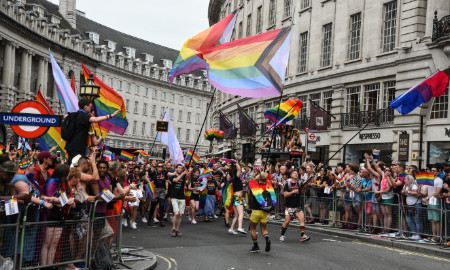Sign up for our free daily newsletter
YOUR PRIVACY - PLEASE READ CAREFULLY DATA PROTECTION STATEMENT
Below we explain how we will communicate with you. We set out how we use your data in our Privacy Policy.
Global City Media, and its associated brands will use the lawful basis of legitimate interests to use
the
contact details you have supplied to contact you regarding our publications, events, training,
reader
research, and other relevant information. We will always give you the option to opt out of our
marketing.
By clicking submit, you confirm that you understand and accept the Terms & Conditions and Privacy Policy
The leaders of the Bar Council and Law Society of England and Wales have marked the start of Pride Month by pledging to better understand the experiences of LGBTQ+ lawyers and how they can support greater inclusion in the workplace.
Nick Vineall, chair of the Bar Council, speaking jointly with his Law Society counterpart Lubna Shuja, said: “Like all lawyers, LGBTQ+ lawyers play an important role in upholding the rule of law, helping shape the justice system and fighting for their clients’ rights. However, we know the fight is not over, and LGBTQ+ lawyers’ experiences must be improved.
“We will continue to understand the experiences of LGBTQ+ lawyers better and work in partnership to remove barriers to inclusion.”
Shuja noted solicitors and barristers would unite to march during London Pride on July 1.
“This year, we will be marching under a banner that says: ‘Fighting for equality under the rule of law’. We are proud to carry this message and will do so throughout this year and beyond,” she said.
The announcement came as the Law Society released data from its 2022 practising certificate survey of almost 2,000 solicitors highlighting responses that showed 80% of LGB solicitors felt supported by their peers and 78% felt that their work is meaningful.
Seven in 10 (69%) of LGB solicitors felt comfortable expressing themselves at work and felt supported by their line manager (70%), with eight in 10 (80%) saying they felt their job utilised their skills.
Areas for improvement, however, included career progression, where only six in 10 respondents felt their jobs offered good prospects for career progression. In addition, less than half of LGB respondents felt their managers involved them in decision-making.
Some 4% of survey respondents identified as gay, 3% as bisexual and 8% declined to answer, with 80% identifying as straight. By contrast, the 2021 UK census showed 3.2% of respondents identified as gay, lesbian, bisexual or other orientations: 1.5% as gay or lesbian, 1.3% as bisexual and 0.5% possessed a different gender identity to their birth sex.
Shuja said that despite progress, there was still work to be done: “We know that solicitors entering the profession may need to decide whether to come out or identify as trans or non-binary in the workplace and with clients.”
She added: “We continue to support our LGBTQ+ members and advocate for inclusive workplaces where our LGBTQ+ colleagues can be their authentic selves at work.”
Shuja, who is the first Asian and the first Muslim woman to become president, concluded: “We will continue to speak with our LGBTQ+ members about their experiences and support them in their careers. No one should be discriminated against for being themselves.”
Email your news and story ideas to: [email protected]


1.jpg)


